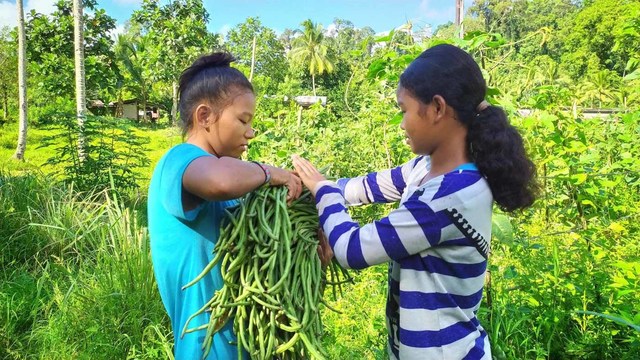This write-up is based on a session organised by PAN Asia Pacific at the Oxford Real Farming Conference 2023 entitled “Building Community Resilience in Indigenous Communities.” A video recording of the session can also be found below.
The 2022 Global Report on the Food Crisis indicates around 193 million people were experiencing hunger, an increase of 40 million people since 2020. According to the report, this is due to prolonged or intensifying conflicts, pre-existing and COVID-19 related shock, weather extremes, the war in Ukraine, or a combination of these factors. However, neoliberal policies in food and agriculture and the push for intensive industrial agriculture have placed millions of people, especially small food producers, into destitution and famine long before. Indigenous peoples are among those particularly affected by these policies.
Maruthan K, an Irula tribal leader, was happy to share skills and knowledge on indigenous and local farming practices to younger people. Through the “Seeding the Change” project initiated by Thanal in 2020—which aimed to provide emergency response to these communities—farmers were able to grow different varieties of millets, peas, rice, oilseeds, and vegetables sustainably and without the use of chemicals.
Known as the “Chief of Soil” in his community, Maruthan relates that the planting season starts in April with traditional offerings and a food festival. He said that many tribals were able to rediscover the “simple” yet full life that marks their culture. “Our diet is very rich; we get non-cultivated crops like tubers from the forest. It was great for others to rediscover that after a gap of around 20 years,” he said.
“Agriculture is always a joy, but it becomes more fun with young people who are willing to listen and learn. Our ancestors have always taught us what to do; each of us can do that,” Maruthan added.
In the Philippines, the Lumad or indigenous peoples in Mindanao—historically discriminated against and facing constant threats of landgrabbing—are setting up schools to preserve cultural practices in food production. One of them is ALCADEV (Alternative Learning Center for Agricultural and Livelihood Development), a secondary school established in 2004.
Eufemia Cullamat hails from the Manobo tribe in Surigao del Sur province and is one of the Lumad leaders asserting their rights to land and resources. “Our ancestral land is where we get all our needs such as food, medicine and livelihoods,” she said.
Sustainable Agriculture is a major part of ALCADEV’s curriculum, alongside Math and Science. “Our goal is to maintain and improve on the good practices of tribal elders and incorporate more advanced farming theories,” said Cullamat.
To enhance soil nutrients, the Lumad plant legumes and apply organic fertilizers. They preserve native seeds of vegetables, corn and rice. They reject the distribution of GMOs in Mindanao communities; they also avoid the use of herbicides because they are aware of health and environmental harms.
“We have achieved enough food for every family and the whole community. However, we are militarized because foreign mining and logging corporations and agribusinesses target our ancestral lands,” Cullamat said.
ALCADEV and other Lumad schools are currently closed because of intensifying militarization of their communities; many of the Lumad are also forced to live in evacuation centers. Cullamat emphasised the need for the Philippine government to pull-out military forces in their communities and reopen Lumad schools.
Meanwhile, in Benin, L’Organisation Béninoise pour la Promotion de l’Agriculture Biologique (OBEPAB) is working with 6,000 farmers in the production of organic cotton, organic soja, organic ground nuts. Women are trained to process, improve, and market high-quality shea nut butter.
“The use of biological and organic materials allows us to nourish the soil. Our experience shows that small-scall producers can still have revenues without damaging the soil by the use of toxic agrochemicals,” said Simplice Davo Vodouhe, OBEPAB coordinator.
Local seeds, better adapted to the climate, are used instead of imported seeds. Climate change adaptation and mitigation strategies, such as maintaining mangrove forests, are planned by the community.
Indigenous women also play a role in preserving forest resources for medicine and therapeutic purposes. “Women play an important role in promoting and transposing knowledge from generation to generation. Agroecological practice ensures that there is protection and transmission of knowledge among indigenous peoples,” Vodouhe further said.
Meanwhile, gender training for men in the village helps to support women in their endeavours. This facilitates a better relationship and overall promotion of women’s livelihoods and involvement in organic agriculture.
Indigenous farming practices follow agroecological principles and use natural resources wisely and sustainably. With indigenous peoples also working to protect and defend ancestral lands, which often make up rainforests and other environmental frontiers, they play a crucial role in building food self-sufficiency and community resilience in the face of economic shocks and climate emergencies. ###








Discussion about this post